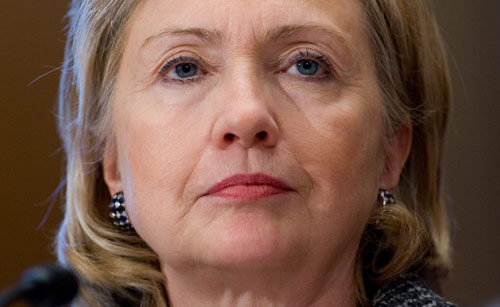Clinton threatens to impose sanctions on Iran soon
U.S. Secretary of State Hillary Rodham Clinton on Wednesday said new sanctions against Iran over its "provocative" nuclear program are expected to be presented in the "next 30 to 60 days.
 |
|
U.S. Secretary of State Hillary Clinton testifies before the Senate Appropriations Committee on the Fiscal 2011 budget on Capitol Hill in Washington, DC. Clinton said Wednesday she hoped to see a UN Security Council resolution on new sanctions against Iran over its contested nuclear program in the "next 30 to 60 days. [Xinhua/AFP Photo] |
"We hope that the next 30 to 60 days will see a sanctions resolution emerge," Secretary Clinton told lawmakers at a Senate Foreign Relations Committee hearing.
Early this week, White House Spokesman Robert Gibbs said Washington has been pushing for the toughest sanctions in the framework of the UN Security Council since last year's Resolution 1874 targeting the Democratic People's Republic of Korea.
Accusing Tehran of refusing to live up to its international responsibility, Clinton said "Iran has left the international community little choice but to impose greater costs for its provocative steps."
Similar remarks have been made by the top U.S. diplomat at a previous Senate hearing on Wednesday morning.
 |
|
U.S. Secretary of State Hillary Clinton testifies before the Senate Appropriations Committee on the Fiscal 2011 budget on Capitol Hill in Washington, DC. Clinton said Wednesday she hoped to see a UN Security Council resolution on new sanctions against Iran over its contested nuclear program in the "next 30 to 60 days. [Xinhua/AFP Photo] |
She told the lawmakers that the Obama administration has been working actively with partners to "prepare and implement new measures to pressure Iran to change its course."
The international community worries Tehran may obtain the uranium fuel needed for nuclear weapons by the same process to purify uranium, while Iran insists its nuclear program is for peaceful purpose.
The Obama administration, avoiding from sending war threat to Tehran, has been trying the so called dual-track, namely engagement and sanction, to bring the international community together to make Iranian leaders realize the "importance of changing their actions and decisions concerning their nuclear program."
 0
0 







Go to Forum >>0 Comments